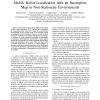Free Online Productivity Tools
i2Speak
i2Symbol
i2OCR
iTex2Img
iWeb2Print
iWeb2Shot
i2Type
iPdf2Split
iPdf2Merge
i2Bopomofo
i2Arabic
i2Style
i2Image
i2PDF
iLatex2Rtf
Sci2ools
121
click to vote
ICRA
2003
IEEE
2003
IEEE
Mobile robot localization with an incomplete map in non-stationary environments
— One of the fundamental problems of the mobile robots is self-localization, i.e. to estimate the self-position by comparing sensor data and a map. In non-stationary environments, a robot should avoid to use changed objects as landmarks in the localization. However, in most previous localization methods, it is assumed that there is no change, or changes are easily identified by sensing. In this paper, we propose a self-localization method that is robust against changes in environments. The method identifies changes from noisy and ambiguous sensor data. Since an object with a random shape may be added at a random position, it generates and utilizes multiple hypotheses about the changes. A number of simulation experiments have been performed in various environments, to demonstrate the effectiveness of the method.
Related Content
| Added | 04 Jul 2010 |
| Updated | 04 Jul 2010 |
| Type | Conference |
| Year | 2003 |
| Where | ICRA |
| Authors | Kanji Tanaka, Tsutomu Hasegawa, Hongbin Zha, Eiji Kondo, Nobuhiro Okada |
Comments (0)

